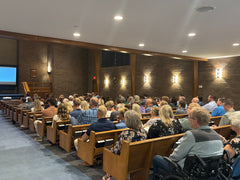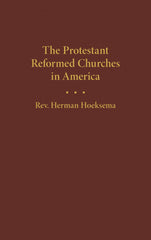Your cart is empty now.

Depravity and Regeneration (3): The Freedom of the Regenerated Believer
What follows is the third entry of a series of articles written by Rev. Wilbur Bruinsma. The second entry is Depravity and Regeneration (2): "Except we are Regenerated"
_______________
In our previous blogs we established according to Scripture and the Confessions that the regenerated, sanctified believer is not totally depraved. They are in error who oppose this beautiful truth. To maintain their error, they malign the one who insists the regenerated believer is able to walk in good works as an outright denial of the doctrine of total depravity. These insist that those saved from the bondage of sin may not view themselves in any other way than as being totally lost in their sin (total depravity).
These have an improper view of the old man of sin versus the new man in Christ (yet another error?). We need to define our terms. To do so let’s take a close look at the old man of sin in the regenerated sinner. This old man is exactly that: that part of our old human condition prior to regeneration that has followed the regenerated person into his new life in Christ. The old nature we received from our parents sticks to us like glue. It was not left behind when God regenerated us. The work of Christ in our sanctification does not eradicate sin in those whom he saved. A regenerated man’s depravity remains, and that in force. This old man, we learn, is “corrupt according to the deceitful lusts” (Ephesians 4:22). It is corrupt, horribly depraved!
The old man is also called “the flesh” in several places in Scripture (e.g., John 3:6; Romans 7:25; Romans 8:4; Galatians 5:17; etc.). Generally, we refer to this as a person’s “sinful flesh” in order to distinguish it from its other use in Scripture as the human body or the physical aspect of a person. Scripture teaches us that in the sinful flesh of the regenerated saint, “dwells no good thing” (Romans 7:18). This is why the Heidelberg Catechism states that the believer is yet “prone by nature to hate God and the neighbor” (Lord’s Day 2; Q&A 5). To put it bluntly, the believer’s sinful flesh or old man of sin is as depraved as the unregenerate man. The believer is able to fall into the same heinous sins as that man who is without God. The sinful flesh or the old man of sin is that “law in my members, warring against the law of my mind, and bringing me into captivity to the law of sin which is in my members” (Romans 7:23).
Neither may we say that I have in me this old man of sin. I am the old man of sin! We might be able to say: there is in me a sinful flesh. At the same time we must admit: I am that old man of sin. Romans 7:14, “For we know that the law is spiritual: but I am carnal, sold under sin. I am the old man of sin because depravity dwells in me. It is in my members. But though this is true, this old man is not my true spiritual identity. The old man is in my members but my true spiritual identity (the inward man), the man of the heart, is through the regenerating, sanctifying work of Christ a perfect man. Quite the paradox!
In order to discover our true spiritual identity we must examine what Scripture teaches about our salvation in Jesus Christ. To do this we turn to Romans 6, a chapter that seems to be ignored when considering the old man. In this chapter we find that Christ has freed us from the hold that the old man has on us. We learn in verse 6, “Knowing this, that our old man is crucified with him [Christ], that the body of sin might be destroyed, that henceforth we should not serve sin.” At the cross Christ crushed the head of the serpent, that is, he destroyed the hold that Satan and sin had on us. Further, in his resurrection Christ instilled in the regenerated believer his resurrection life making us alive unto God. Verse 11: “Likewise, reckon ye also yourselves to be dead indeed unto sin, but alive unto God through Jesus Christ our Lord.” Christ through his work on the cross and in his resurrection has destroyed the dominion (supreme rule) of sin and Satan over his people. They still have a sinful flesh in them, but such sin does not rule over them. They are no longer given over to the power and dominion of sin. Verse 14: “For sin shall not have dominion over you: for ye are not under the law, but under grace.” Paul concludes his reasoning in verse 22, “But now being made free from sin, and become servants to God, ye have your fruit unto holiness, and the end everlasting life.”
The freedom the regenerated believer enjoys from sin is certainly not the same as that of Adam and Eve in Paradise prior to the fall. They had no sin. We do. The old man still plagues us. Our freedom consists in this: sin does not reign over us! It reigns over the unregenerate man. He is totally depraved, wholly given over to sin. The regenerated believer, however, is a new creature in Christ. The dominion of sin has been destroyed. He, therefore, is no longer totally given over to that depravity. His heart, mind and will have been set free to serve God. He is now become the new man in Christ. Christ is not the new man. Christ works in the heart of the regenerated believer and as a result the believer becomes the new man. Though the sinful flesh is still in him, though he is in his members the old man, nevertheless he is become in Christ a perfect man. 1 John 3:9, “Whosoever is born of God [regenerated] doth not commit sin; for his seed remaineth in him: and he cannot sin, because he is born of God.” This is the regenerated saint’s new identity. 2 Corinthians 5:17, “Therefore if any man be in Christ, he is a new creature: old things are passed away; behold, all things are become new.”
To insist that a regenerated child of God is still given over totally to sin, therefore, denies the work of Jesus Christ both in his death and resurrection. What did Christ actually accomplish on the cross if we as God’s children are still lost in our sin? It simply is not true that we only do evil and when any good comes out in us we are not doing it, but Christ is doing it for us.
Next blog we intend to explain the battle that takes place within the believer as a result of the new qualities infused into his will with salvation, a battle that would never take place if the regenerated man remained totally depraved.
The content of the article above is the sole responsibility of the article author. This article does not necessarily reflect the opinions and beliefs of the Reformed Free Publishing staff or Association, and the article author does not speak for the RFPA.

Donate
Your contributions make it possible for us to reach Christians in more markets and more lands around the world than ever before.
Select Frequency
Enter Amount










